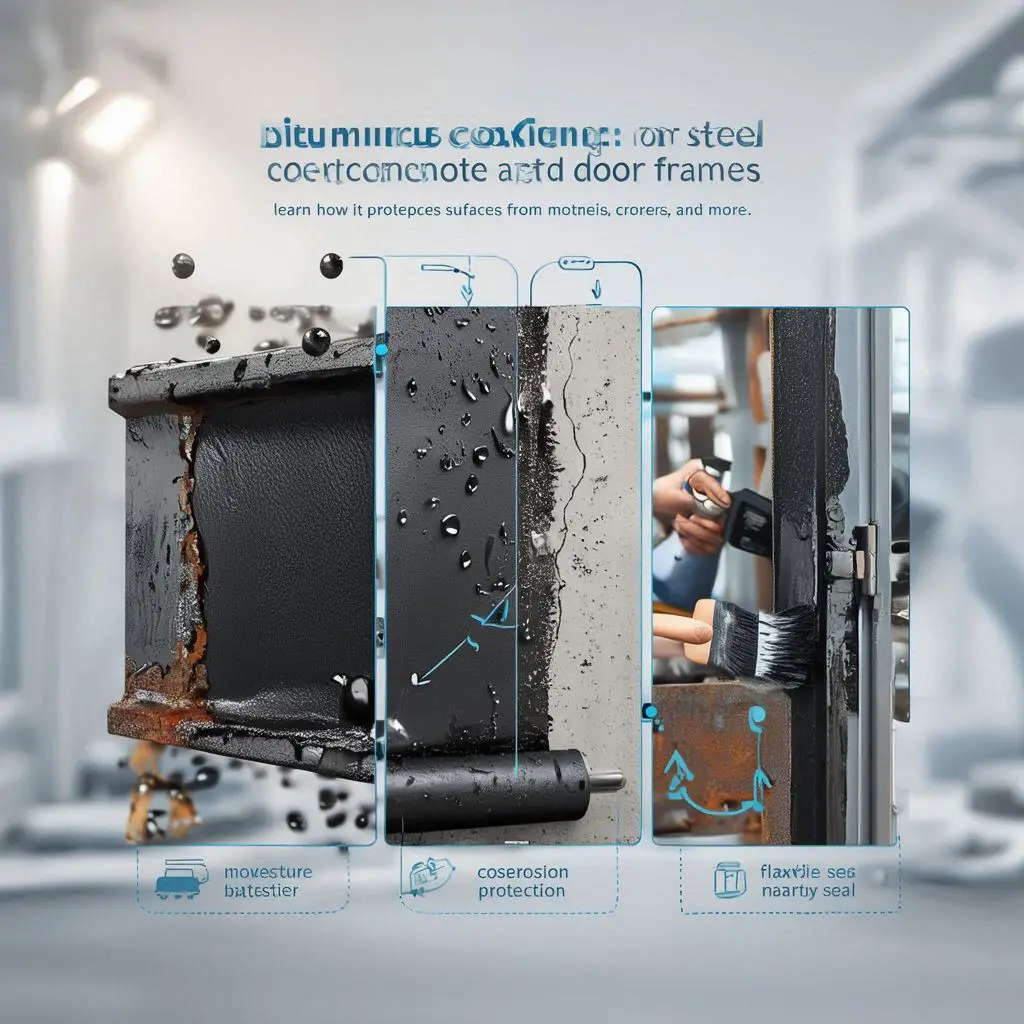
Bituminous Coating: For Steel, Concrete and Door Frames
Bituminous coating is a trusted protective layer used in various construction applications, especially for steel, concrete, and door frames. Learn how it protects surfaces from moisture, corrosion, and more.
INTRODUCTION
Bituminous coating, also known as asphalt coating, is a flexible, durable, and waterproof material commonly used in the construction industry to protect surfaces. Whether you're working with steel reinforcements, concrete structures, or metal door frames, bituminous coating serves as a reliable solution for corrosion and water resistance. It offers cost-effectiveness and long-lasting performance in both residential and industrial settings.
BITUMINOUS COATING
Bituminous coating is a protective barrier that resists moisture and corrosion on various surfaces.
Bituminous coating is a black, viscous material derived from refined bitumen. It is applied in liquid form and hardens into a waterproof film, providing excellent protection against water ingress, UV radiation, and chemical exposure. Its applications are widespread—from bridges and basements to pipelines and building structures. Bituminous coating is valued for its elasticity, adherence, and versatility.
This material can be applied through brushing, spraying, or troweling depending on the substrate and environmental condition. Because it adheres well to surfaces like concrete and metal, it's a popular choice in both above-ground and below-ground construction.
BITUMINOUS COATING FOR STEEL
Bituminous coating shields steel surfaces from rust and degradation caused by moisture and salts.
Steel, when left exposed to atmospheric moisture and chemicals, is susceptible to corrosion. Bituminous coating acts as a barrier, sealing the surface from water, salts, and industrial pollutants. In industries like oil & gas, marine, and construction, this coating is commonly applied to steel beams, pipes, reinforcements, and structural components.
Additionally, it extends the service life of steel structures and minimizes the need for frequent maintenance. Bituminous coating for steel is often used in compliance with ISO and ASTM standards, ensuring consistent performance.
BITUMINOUS COATING FOR CONCRETE
Bituminous coating prevents water infiltration and protects concrete from chemical attacks.
Concrete may appear durable, but it is porous and can absorb water, leading to cracks and damage over time. Bituminous coating forms a continuous layer over concrete surfaces, blocking moisture and chemicals. It’s particularly useful for foundations, tunnels, basements, and water-retaining structures.
The coating not only prevents water ingress but also improves the resistance of concrete against chloride ions, sulphates, and aggressive chemicals—ensuring longevity and structural integrity. Its application is a critical step in damp-proofing and waterproofing systems.
BITUMINOUS COATING FOR DOOR FRAMES
Protecting metal door frames from corrosion and weathering is easy with bituminous coating.
Metal door frames, especially those installed outdoors or in humid environments, are vulnerable to rust and corrosion. Bituminous coating offers an economical and effective way to seal these surfaces against water and air exposure.
Its dark color and UV-resistant properties also make it suitable for decorative applications or as a primer before painting. For architects and builders, this type of coating is a go-to solution to enhance the durability and life of metallic frames in both residential and commercial buildings.
BITUMINOUS COATING VS OTHER PROTECTIVE COATINGS
While there are several coating options, bituminous coating stands out for affordability and versatility.
Compared to epoxy, polyurethane, and zinc-rich coatings, bituminous coating provides a unique combination of flexibility and water resistance at a lower cost. Epoxy coatings may offer better abrasion resistance, but bitumen's elasticity helps it perform well in environments where surface movement or thermal expansion is a concern.
Furthermore, bituminous coatings are solvent-free or low-VOC, making them more environmentally friendly. Their ease of application and fast drying time make them a favorite in field conditions.
CONCLUSION
Bituminous coating is a robust, adaptable solution that offers effective protection for steel, concrete, and door frames. With its waterproof, anti-corrosive, and UV-resistant properties, it is an essential material in construction and infrastructure maintenance. Whether you're looking to shield steel reinforcements, waterproof a basement, or protect a door frame, bituminous coating remains a cost-efficient and high-performing choice.
By integrating it into your project, you ensure longevity, safety, and performance—delivering value in both the short and long term. For optimal results, always choose high-quality bituminous products and follow industry best practices during application.
Moreover, bituminous coatings align well with sustainable building practices due to their low VOC formulations and compatibility with energy-efficient structures. Their resilience in diverse climatic conditions makes them ideal for global use, from hot, humid environments to cold, moisture-prone areas. As demand for protective coatings continues to rise in modern construction, bituminous solutions stand as a proven and scalable choice for professionals seeking long-lasting, adaptable protection.
FREQUENTLY ASKED QUESTIONS (FAQS)
What is the purpose of bituminous coating?
It provides waterproofing and corrosion resistance to protect steel, concrete, and other materials.
Can bituminous coating be used on wood or plastic?
While it’s primarily for metal and concrete, it can sometimes be applied to wood. It’s not recommended for plastic surfaces.
How long does bituminous coating last?
Depending on environmental exposure and surface preparation, it can last between 5 to 15 years.
Is bituminous coating environmentally friendly?
Many modern bituminous products are solvent-free or low in VOCs, making them safer for the environment.
Does bituminous coating need maintenance?
Minimal maintenance is required, but periodic inspection ensures long-term performance.

